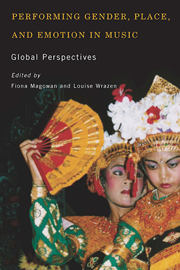Book contents
- Frontmatter
- Contents
- Acknowledgments
- Introduction: MusicalIntersections, Embodiments, and Emplacements
- Part One Landscope and Emotion
- 1 EngenderingEmotion and the Environment in Vietnamese Music and Ritual
- 2 Gendering Emotional Connections to the Balinese Landscape: ExploringChildren's Roles in a Barong Performance
- 3 PerformingEmotion, Embodying Country in Australian Aboriginal Ritual
- Part Two Memory and Attachment
- Part Three Nationalism and Indigeneity
- Afterword
- Selected Bibliography
- List of Contributors
- Index
3 - Performing Emotion, Embodying Country in Australian Aboriginal Ritual
from Part One - Landscope and Emotion
Published online by Cambridge University Press: 05 December 2013
- Frontmatter
- Contents
- Acknowledgments
- Introduction: MusicalIntersections, Embodiments, and Emplacements
- Part One Landscope and Emotion
- 1 EngenderingEmotion and the Environment in Vietnamese Music and Ritual
- 2 Gendering Emotional Connections to the Balinese Landscape: ExploringChildren's Roles in a Barong Performance
- 3 PerformingEmotion, Embodying Country in Australian Aboriginal Ritual
- Part Two Memory and Attachment
- Part Three Nationalism and Indigeneity
- Afterword
- Selected Bibliography
- List of Contributors
- Index
Summary
The saltwater … here it rests in the saltwater country, but it all has names. … Also the rocks. Rocks that the country holds. Where the water moves … where it rests. There are places there, names there, names that are special that Yolngu receive in their heads. And sing and give names to children.
—Djambawa MarawiliPerforming the Law
After a rough drive along the dirt road leading away from the township of Galiwin'ku, in northeast Arnhem Land, we came into an outstation on the coast (see map 3.1). Some family members were sitting on their raised verandas in the shade. One of the three Yolngu women traveling in the car gestured that they should go to a thick mangrove cluster close to the sea to gather shellfish and mud crabs. As they departed, I, along with another non-Aboriginal friend who also knew the family and had a long history in the region, took the opportunity to meet with one of the clan leaders. We walked toward the shoreline, where an inlet led around to a rocky headland along the white beach. After some general conversation, and in response to some questions about the genealogy of the area, he offered fragments of information about the ancestor who had traversed the promontory in the distant past, establishing his clan rights and those of his kin there. I had already analyzed a range of song series in the region and knew something of the history of the ancestors in the area.
- Type
- Chapter
- Information
- Performing Gender, Place, and Emotion in MusicGlobal Perspectives, pp. 63 - 82Publisher: Boydell & BrewerPrint publication year: 2013

